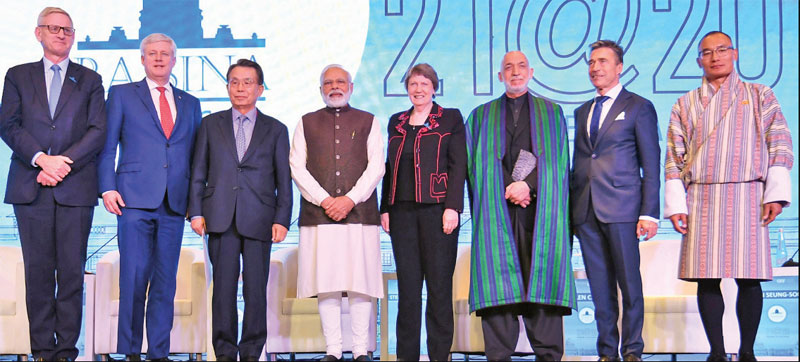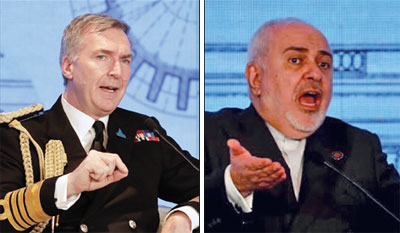From defining the Indo-Pacific to fighting terrorism, Raisina Dialogue 2020 reverberated with engaging sessions
Palak Gupta
The three-day Raisina Dialogue, a multi-lateral conference held annually, kicked off on 14 January 2020 on the theme ‘Navigating the Alpha Century.’ Seven former heads of state or government shared their perspectives and deliberated on challenges faced by the world such as the spiralling US-Iran tensions, Afghan peace initiatives, terrorism, radicalisation, and climate change, during sessions held at Taj Palace Hotel in New Delhi.

The conclave, inaugurated by Prime Minister Narendra Modi, witnessed participation of foreign ministers from 13 countries including Russia’s Sergey Lavrov and Iran’s Javed Zarif. India’s external affairs minister Subrahmanyam Jaishankar was also present.
Australian Prime Minister Scott Morrison, who was scheduled to deliver the inaugural address at the Raisina Dialogue, had to call off his four-day visit to India due to devastating bush fires in several parts of his country. Morrison, however, sent a video message wherein he said that India is and will remain the ‘strategic lynchpin’ in the Indo-Pacific.
The Raisina Dialogue also saw the participation of many deputy foreign ministers, national security advisors, military chiefs and other high level policy-makers, scholars and officials.
Zarif’s participation assumed significance as it came on the heels of the killing of Iranian Quds Force commander Qassim Suleimani. The Iranian General, a prominent national figure, military strategist and the public face, was assassinated on January 3 near the Baghdad International Airport by a Pentagon-ordered drone attack.
During his speech at the event, Zarif said 430 India cities had organised spontaneous commemoration meetings after the killing of their top commander Qassem Soleimani. “The US says Iran has proxies. But do we have proxies in India? The US should understand our reach in other cities,” he said. The Iranian foreign minister maintained that the killing of Soleimani shows ignorance and arrogance of the US.
The three days were packed with back-to-back sessions, covering a wide-range of topics, such as ‘Right to Breathe’, ‘Hacking Democracy: Defending Pluralism in the Digital Age’, ‘Competing Nationalisms’, Universal Norms: Street Power in 21st Century Diplomacy’, ‘Fluid Fleets: Navigating Tides of Revision in the Indo-Pacific’ and so on. The after-sessions conversations at lunch and dinner (which were by invite only) followed by late-night discussions over Kashmiri kahwa (tea) were the icing on the cake.
One particular session was unique in that the panel constituted only women and focussed on the role of women shaping political outcomes across the world. Smriti Irani, minister of women and child development and former New Zealand Prime Minister Helen Clark were the chief panellists at the session titled ‘#SheLeads in the Alpha Century: The New Narratives of Transformations and Change’.
However, it was the discussion around Indo-Pacific that hogged all the limelight. Russian foreign minister Sergey Lavrov left the audience in the hall stunned when he lashed out at the western construct of a ‘rules-based world order’ and questioned the idea behind the concept of ‘Indo-Pacific’, which according to him is as an attempt to ‘reconfigure’ the region.
“Why do you need to call Asia Pacific as Indo-Pacific? The answer is evident – to exclude China. Terminology should be unifying, not divisive. Neither Shanghai Cooperation Organisation (SCO) nor the Brazil, Russia, India, China and South Africa (BRICS) grouping is exclusionary,” said Lavrov, adding that “our Indian friends are smart enough to understand that.”
Continuing to speak, he said with a note of caution, “When we asked the initiators how Indo-Pacific is different from Asia Pacific, we were told it is more democratic. We don’t think so. It is rather tricky. We have to be careful about the terminology which looks benign but is not.”
The Russian foreign minister also used the opportunity to root for India’s seat in the United Nations Security Council (UNSC). “We have repeatedly reiterated our position that India and Brazil along with an African country should be in the UNSC.”
Another key session of the event, co-hosted by the ministry of external affairs (MEA) and New Delhi-based think-tank Observer Research Foundation (ORF), was on the Indo-Pacific, and it included naval commanders from the ‘Quadrilateral or Quad’.

The panel for the discussion included Chief of Naval Staff (CNS) Admiral Karambir Singh, Chief of Staff, Joint Staff of the Japan Self Defence Forces General Koji Yamazaki, Vice Chief of the Defence Force, Australia Vice Admiral David Johnston, France’s General Luc de Rancourt from ministry of armed forces and the UK’s Chief of Naval Staff Admiral Tony Radakin. Together, they all deliberated upon important questions about the Indo-Pacific: Who defines it? Who will bear the cost of this strategic orientation? And so on.
Admiral Singh flagged China’s ambitious multi-billion dollar Belt and Road Initiative (BRI) and the China–Pakistan Economic Corridor (CPEC), saying they impinge on India’s sovereignty.
“China’s BRI and the CPEC impinge on our sovereignty. There have been instances when People’s Liberation Army (PLA) ships entered our exclusive economic zones (EEZ); we told them that it impinges on our interests. There has been increasing Chinese involvement in the Indian Ocean,” he said. The CNS also cautioned that the Indian Navy is keeping a watch over the developments (in the IOR) through “mission-based” deployments.
The first session of Day Three titled ‘Poachers as Gamekeepers: Can Terror Incubators Counter Terror?’ dwelled upon the struggle against terrorism. The panel attempted seeking out-of-the-box solutions for the fight against terror, both online and offline.
Chief of Defence Staff (CDS) General Bipin Rawat, former Prime Minister of Canada Stephen Harper, CEO of Moby Group Saad Mohseni, the UK’s special representative on Afghanistan and Pakistan Gareth Bayley attended the session.
Strongly voicing his views on the state of radicalisation and its effects, General Rawat said, “What we saw in Kashmir, we saw radicalisation happening. Today, we are seeing radicalisation being undertaken even amongst young people. Girls and boys as young as 10-12 are now being radicalised. These people can still be isolated from radicalisation in a gradual way, but there are people who have been completely radicalised. These people need to be taken out separately and possibly taken into some deradicalisaiton camps.”
General Rawat stressed that radicalisation is taking place in schools, universities, religious places and sites. “First, we need to get to the nerve of who is radicalising people… You can start isolating these people gradually and then start a counter-radicalisation programme by identifying people who have been radicalised and to what degree,” he said.
The General, in a veiled attack on Pakistan, pointed out that terrorism will remain “as long as there are states that sponsor it.”
“Terrorism is here to stay as long as there’ll be states that’ll sponsor terrorism and they are going to use terrorists as proxies, make weapons available to them, make funding for them, then we can’t control terrorism,” he said.
General Rawat suggested following the American model (to combat terrorism) which the country had adopted after the deadly 9/11 attack.
“We’ve to bring an end to terrorism and that can only happen the way Americans started after 9/11. They said let’s go on a spree on global war on terror. To do that you have to isolate the terrorists. Anybody who is sponsoring terrorism has to be taken to task,” General Rawat pointed out.
Discussions on the Third Day included topics such as ‘Coded to Kill: Proxy Wars and Autonomous Systrems’, ‘Plural Waters: Strengthening Democracy in the Indo-Pacific’ and many more.
In an unrelated event, senior US diplomat and principal deputy assistant secretary of state for South and Central Asia Alice Wells, while addressing a briefing on her recently-concluded three-nation tour (India, Pakistan and Sri Lanka) on January 25, said that the success of the Raisina 2020 was a reflection of India’s prominent role on the world stage and being at the heart of the Indo-Pacific region. Wells, along with US deputy National Security Advisor Matthew Pottinger, was the part of a delegation which attended the Raisina Dialogue.
The valedictory address was delivered by Vice President of the European Commission and High Representative for Foreign Affairs and Security Policy, European Union, Josep Borrell.
Irrefutably, the conference, with every passing year, keeps getting bigger and better, covering topics that are or will be our chief concerns. But the question remains: Where will these discussions lead us to? The plush roundtable discussions radiating all the glamour and charm need to be implemented and executed too.

